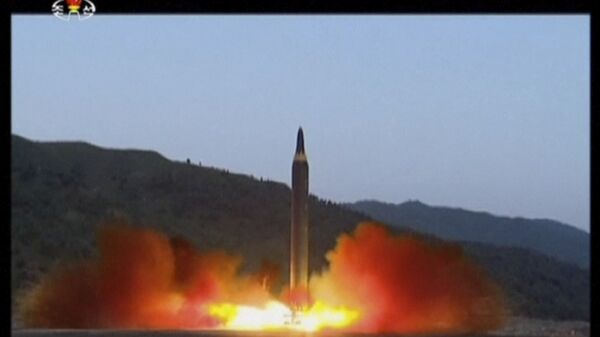Pyongyang lashed out at the US and South Korea, blaming the two nations for forcing the DPRK to conduct missile tests earlier this year. An article in North Korea’s official newspaper Rodong Sinmun blamed US “Imperialistic behavior” and “double-dealing” with South Korea for undermining the denuclearization process, Newsweek reported Thursday.
"We are living in a world where imperialistic behavior to play with the sovereignty of other countries is getting more blatant than ever and not a few countries are forced to choose an abject fate because they have no power to defend themselves," the article reads. "Today we are experiencing every day from the bottom of our heart how proud it is to work for self-reliance, while realizing how much price we should pay as a result of submission to the stronger and dependence on outside powers.”
According to the article, the United States initiated denuclearization talks, but at the same time engaged in military excercises with Seoul, activities that Pyongyang views as rehearsals for invasion.
In 2018, US President Donald Trump attended a historic summit with North Korean leader Kim Jong Un in Singapore, the first top-level contact between the two nations. It was followed by a 2019 summit in Hanoi, which ended after Trump left abruptly, citing unacceptable North Korean demands.
Despite the diplomatic incident, the two leaders briefly met again in July during Trump’s visit to South Korea. The July meeting marked the first time an American leader has stepped on North Korean soil, which Trump called a “great honor.”
Despite the positive dynamic, in July the US said it will not cancel its joint naval drills with Seoul, prompting Pyongyang to commence new missile tests, sparking international criticism.
Despite complaints from US allies, Trump did not consider the tests noteworthy, saying that since the missiles were short-range, they do not pose a significant threat. The joint military drills went ahead in August, ending early last week. Several days after the drills ended, North Korea conducted another, its seventh, missile test.
According to Newsweek, the Trump administration is unwilling to undermine what are considered by the administration to be historic diplomatic achievements by condemning the missile launches.
On Wednesday, US Secretary of Defense Mark Esper said that Washington wants "to understand what they're doing and why they're doing it," but stressed that the administration would not "overreact" to the recent tests, Newsweek report says.
"We want to take a measured response and make sure we don't close the door to diplomacy," Esper said.




